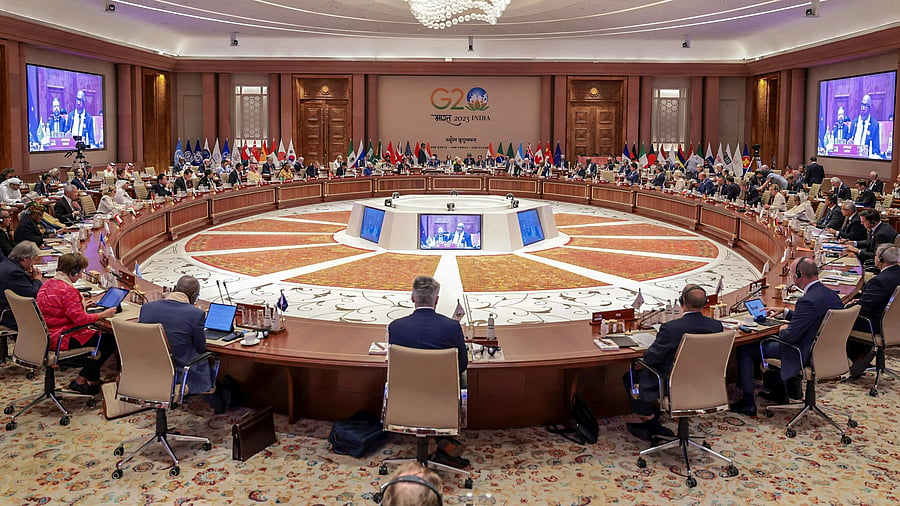
Prime Minister Narendra Modi and other leaders during G20 Summit.
Credit: PTI Photo
By endorsing the recommendations of the International Monetary Fund (IMF) and the Financial Stability Board (FSB), the G20 member countries have laid a foundation for regulation of cryptocurrency assets, and thus a blanket ban on this new emerging technology is unlikely, a senior government official said.
“If any country wants to ban it you can ban it, but if the rest of the countries are not banning it will be extremely difficult to implement the ban,” said the official.
While G20’s agreement on crypto regulation is important, it may not be fully effective unless a coordinated action is taken by all the countries, the official said, adding that In India, now the policy deliberations will be held on two fronts.
On the multilateral level, India will push for a consensus on G20 regulations. The crypto issue has been included in the G20 agenda at the behest of India. The centre is also pushing for a consensus on crypto regulations also among the countries which are not part of G20. “It has to be taken beyond G20,” said the official.
Domestically, the government will come out with a regulation in line with the consensus developed at the multilateral platforms, the person added.
The official’s comments are a change from the earlier stance, when India, especially the Reserve Bank of India, was one of the strongest proponents of banning cryptocurrency.
On the possible crypto regulations, the official said the framework is ready and the focus now would be on regulations. “The roadmap has come, now what needs to be worked upon is the implementation part,” the official added.
Meanwhile, the centre’s Economic Affairs Secretary Ajay Seth briefed the media on Sunday, on the sidelines of the Leaders’ Summit. Speaking on the FSB and IMF crypto regulation roadmap, he said: “Our leaders have endorsed it. That is the highest level of activity that can happen in G20.”
The G20 leaders on Saturday endorsed the Financial Stability Board’s (FSB’s) high-level recommendations for the regulation, supervision and oversight of crypto assets. “We ask the FSB and SSBs (standard setting bodies) to promote the effective and timely implementation of these recommendations in a consistent manner globally to avoid regulatory arbitrage,” noted the G20 New Delhi Leaders’ Declaration.
When asked what the G20 leaders’ endorsement of FSB recommendations mean for the future of crypto, Seth said, “The foundation is laid. Beyond that, how much you want to go is for us to decide in the coming months.”
The G20 members are likely to take forward the discussion on crypto regulations in the upcoming Finance Ministers and Central Bank Governors meeting, scheduled to take place in Marrakech, Morocco in October.
Currently, cryptocurrencies in India as also in other parts of the world are largely unregulated. In 2017, the RBI had imposed a ban on cryptocurrency. However, the Supreme Court struck down the RBI’s decision in 2020.
In 2021, the government had proposed to introduce a bill in the parliament for the regulation of cryptocurrencies, but Finance Minister Nirmala Sitharaman had said that a law would only be tabled once global consensus is reached. This is why India had cryptocurrency as a major agenda item during its G-20 Presidency.